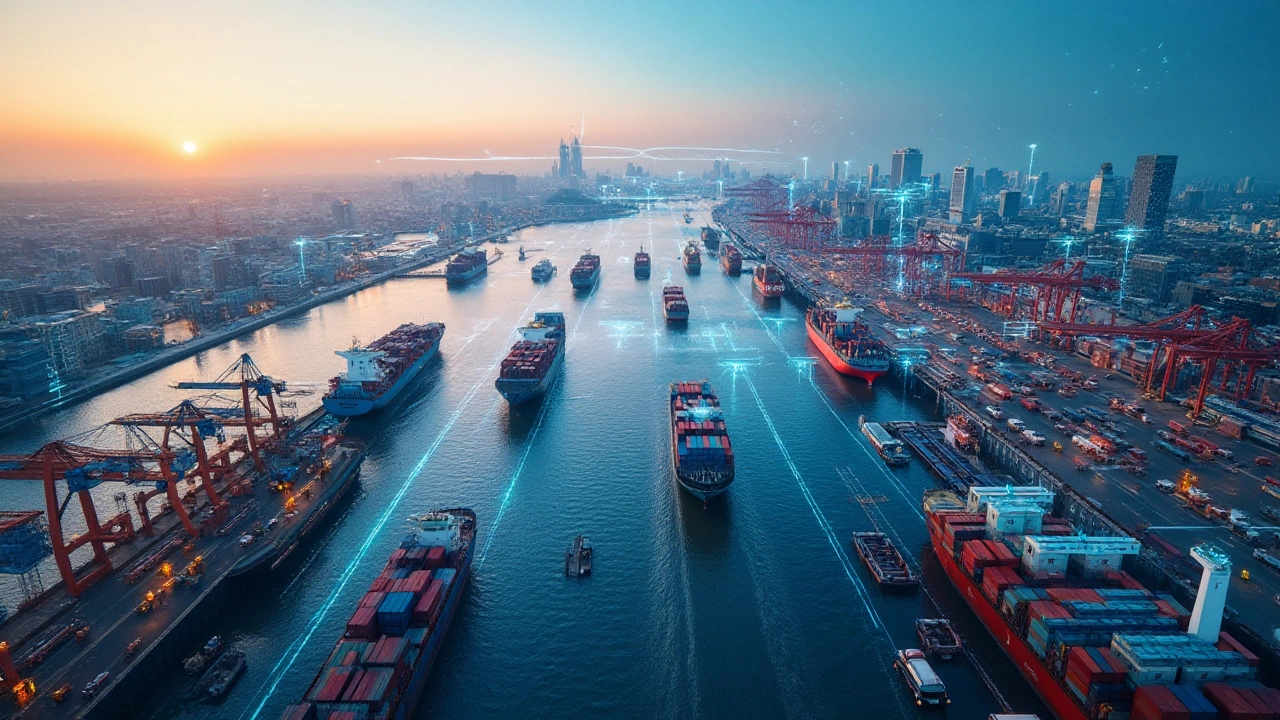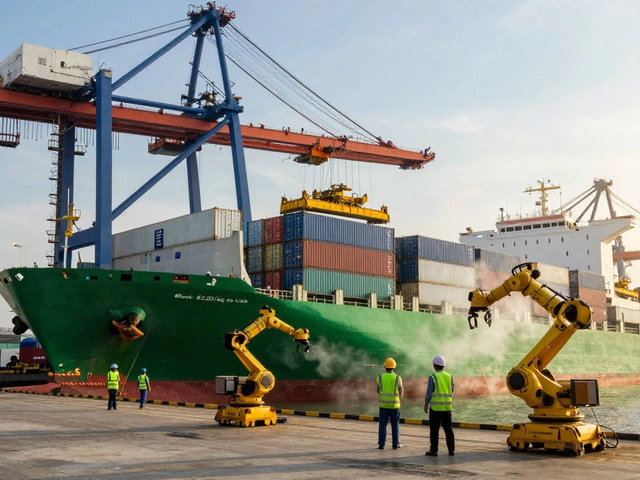Shipping products across borders isn't just about moving a package from one place to another; it's about navigating a complex network of logistics, regulations, and customer expectations. Companies today are constantly looking for ways to improve their shipping strategies to remain competitive in a global market.
Whether you're a small business taking your first steps into international waters or a seasoned player looking to refine your processes, understanding the nuances of global shipping can make a significant difference. Selecting the appropriate shipping carrier can impact both your cost and delivery times, while staying updated with customs regulations ensures a seamless transfer.
Diving into the intricacies of shipping costs and leveraging new technology can profoundly affect your success in delivering goods worldwide. Let's explore these different facets of international shipping to help guide your business into making informed decisions, ultimately paving the road for smooth and efficient global operations.
- Choosing the Right Shipping Carrier
- Understanding Customs and Regulations
- Optimizing Shipping Costs
- Leveraging Technology in Shipping
Choosing the Right Shipping Carrier
Choosing the right international shipping carrier is pivotal to the success of any business looking to expand its horizons and cater to a global audience. The decision isn't just about finding a company that will transport your goods from one country to another; it's about selecting a partner that aligns with your business values, service expectations, and budget. A well-chosen carrier can not only save you money but also enhance customer satisfaction, influencing how your brand is perceived internationally. Many businesses start their search by identifying their shipping priorities. Is it speed, cost, reliability, or a combination of these factors? Often, the chosen priority influences the final decision. Companies committed to fast delivery might lean towards carriers with express options, while cost-conscious enterprises might prefer those offering competitive rates. Cost isn't just about the shipping fee; it encompasses duties, customs, and hidden fees that may not be immediately apparent.
Reliability is another crucial element. Imagine the implications of a delayed shipment affecting an entire supply chain. To gauge reliability, businesses often review performance histories, customer feedback, and punctuality records of potential carriers. A reputable carrier will have a proven track record of meeting or exceeding delivery promises. For businesses new to international shipping, it can be enlightening to consult industry experts or utilize logistics consultants who can provide invaluable insights into carrier reputations. These professionals might also aid in negotiating better terms or uncovering carrier weaknesses not immediately apparent. Additionally, understanding the geographical strengths of a carrier can be beneficial. Some companies may excel in shipping to specific regions, offering better rates or faster services based on their established networks and partnerships in those areas.
"Choosing a shipping carrier is more than evaluating price; it's about finding a collaborator in your business journey," says Tom Yorke, a logistics analyst at the International Shipping Forum. His insights emphasize the value of developing a relationship with your carrier, potentially leading to better deals and more flexible service options in the long run. An often overlooked factor in choosing the right global logistics partner is technological capabilities. In today's digital age, having access to a robust tracking system is imperative. It allows businesses to offer their customers real-time updates, fostering transparency and trust. Reliable carriers offer advanced technology solutions, enabling better visibility throughout the shipment life cycle.
Many businesses also consider the eco-footprint of their shipping choices. As environmental awareness grows, companies are pressured to implement greener practices, and choosing a carrier that shares these values can benefit your business perception too. Statistics show that businesses favoring environmentally friendly options are seeing enhanced brand loyalty and increased sales among conscious consumers. Some major carriers now offer carbon-neutral shipping options, an initiative that can be a win-win for both businesses and the environment. Ultimately, the selection process might include compiling a list of requirements and conducting thorough research to compile a list of prospective carriers. Engaging in conversations, requesting quotes, and comparing the services can go a long way in identifying the right partner for your specific needs and business goals.
Understanding Customs and Regulations
When it comes to tackling international shipping, one of the most crucial aspects is getting the hang of customs and regulations. Every country has its own set of rules, which can affect how easily goods move across borders. If businesses overlook these details, they might face delays, additional costs, or even penalties. It's imperative to have a clear understanding of what these regulations entail. Customs duties and taxes, for instance, can vary significantly based on the country, the type of goods, and the shipment value. Knowing these nuances beforehand can save a lot of headaches and ensure a smoother shipping process.
Lately, there's been a trend towards more digitized customs procedures. With systems like the Automated Commercial Environment (ACE) in the United States and the Union Customs Code in the EU, it's becoming easier—but not foolproof—to manage shipments electronically. These systems are primarily designed to streamline the process, enhancing efficiency and transparency. However, it’s still important for businesses to ensure their documentation is complete and precise. Inaccurate paperwork can lead to shipment confiscation, fines, or serious shipping delays, which, ultimately, can damage the reputation of a business. Staying current with these advancements and being aware of changes in customs processes are key in maintaining an edge in global logistics.
An interesting aspect of customs is how regulations can change abruptly based on diplomatic relations or economic sanctions between countries. For instance, the ongoing changes in tariffs between major economic blocs can create a roller-coaster effect on shipping routes and costs. Supply chain managers need to be agile, quickly adapting to these shifts to avoid disrupting their business operations. As noted by the World Customs Organization, approximately “80% of world trade is affected by standards and regulations.” This underscores the magnitude and importance of staying informed about these regulatory environments.
"Understanding and anticipating customs regulations can significantly improve your logistics efficiency and reduce unnecessary costs", says Dr. Maureen Murphy, a logistics expert at the International Trade Centers Network.
One helpful strategy for navigating these complexities is to engage with customs brokerage services. These services are composed of specialists who can facilitate the clearing of goods, ensuring compliance with all necessary regulations. Their expertise can be tremendous, especially for businesses that lack extensive in-house knowledge about international trade laws. They can aid with tariff classifications, valuing shipments accurately, and assisting with essential documentation, making the shipping process less daunting.
Moreover, embracing technology can play a vital role in this landscape. Businesses can leverage software solutions that automate such processes, prompting reminders about renewal deadlines for necessary permits or certifications. By doing so, not only do companies enhance compliance, but they also streamline their operations, permitting focus on other essential elements like reducing shipping costs or improving delivery times. In the fast-paced world of international shipping, staying ahead of customs regulations is not just smart; it's necessary.

Optimizing Shipping Costs
When it comes to international shipping, the prospect of reducing expenses is alluring for businesses seeking to expand their global footprint. The first step in slashing costs is to scrutinize every link in the logistics chain. Often, companies overlook the subtle fees that pile up, from packaging components to remote area surcharges. One practical way to handle this is negotiating rates with carriers. Shipping providers are more flexible than they might appear, especially if you demonstrate a clear understanding of industry pricing models. Knowing your product weight dimensions, and shipping destinations empower you to leverage better offers.
Consolidation is another pivotal strategy. By amassing smaller parcels into a single, larger shipment, not only are you minimizing the per-unit cost, but also reducing the headaches of managing multiple customs clearances. However, consolidation demands precise coordination and timing. It saves considerable expenses but requires robust planning. Utilizing regional fulfillment centers can also play a role in optimizing your shipping costs. By storing products closer to your customer base, you minimize last-mile delivery expenses, which are notoriously high.
Choosing the right packaging can also make a significant difference. Not only does proper sizing help in safeguarding products, but it also minimizes weight-based charges levied by carriers. Ill-fitting packages lead to wasted space and unnecessary charges. One innovative solution is employing eco-friendly materials, which are lightweight and often come with cost-saving subsidies. A shipping expert once said, "The boxes you choose today shape the profits you’ll earn tomorrow." The emphasis on packaging optimization and sustainability can not only save costs but also boost brand reputation.
Monitoring and analyzing your shipping data can reveal hidden inefficiencies. Data analytics tools can provide insights into shipping delays, frequent routes, and return rates. With such information at your fingertips, adjusting shipping methods or even shifting to another carrier becomes clearer. A 2023 report by a major logistics firm indicated that companies employing data-driven decisions in their shipping logistics reduced their costs by an average of 20%. By embracing technology, you make informed, strategic adjustments that pay off significantly.
Leveraging Technology in Shipping
In today's fast-paced global market, leveraging cutting-edge technology in international shipping is not just an advantage but a necessity. Businesses are turning to advanced solutions to streamline their logistics operations, enhance efficiency, and meet ever-growing customer expectations. From AI-driven logistics software to blockchain in supply chain management, these innovations are reshaping how companies approach cross-border delivery. Notably, the rise of Internet of Things (IoT) devices has made it easier to track shipments in real-time, reducing delays and providing transparency to both businesses and customers. These tools can predict potential disruptions in the global logistics network, such as weather conditions or geopolitical tensions, allowing businesses to reroute shipments proactively.
Breaking down communication barriers within the supply chain is another critical benefit of adopting technology. Digital platforms offer seamless integration between various stakeholders, from suppliers to carriers, enabling instant information exchange. This cohesion is vital in reducing the errors that can occur during manual data entry or disparate record-keeping systems. Take RFID and GPS tracking systems, for instance, which have become increasingly popular. They provide precise location data and enhance security by alerting companies of unauthorized access to shipments. Blockchain, too, is coming to the forefront; it promises enhanced visibility and ensures the integrity of transaction records. A distributed ledger can authenticate transactions, mitigating fraud and establishing trust across the supply chain.
Technology also allows businesses to optimize shipping costs significantly. Predictive analytics can help companies assess the most cost-effective shipping routes and carriers, factoring in variables like fuel prices and seasonal demand variations. Utilizing automated processes reduces labor costs and minimizes human error, ensuring that resources are allocated efficiently. Some businesses have adopted drone technology and autonomous vehicles to handle last-mile delivery, cutting transportation times and costs. An insightful quote by Maersk’s Chief Digital Officer notes, "The future of shipping lies in the integration of digital solutions with existing business processes to drive agility and resilience." Implementing the right technology demands a strategic approach, where businesses must continuously assess their needs and adapt accordingly.
As the industry evolves, adapting to technological advances becomes critical to staying relevant. Artificial intelligence and machine learning are revolutionizing predictive maintenance, ensuring that equipment and machinery in warehouses and shipping fleets are in peak condition and reducing downtimes. Automated warehouses, powered by robotics, enhance the speed and accuracy of order fulfillment. A study showed that automation can increase warehouse efficiency by up to 30%, a compelling statistic for companies looking to optimize operations. Additionally, the move towards greener technology like electric vehicles and sustainable packaging shows the industry's recognition of its environmental impact. As consumer consciousness about carbon footprints grows, technology offers solutions to make supply chains more environmentally friendly.
In conclusion, embracing international shipping technology is vital for companies aiming to thrive in the competitive global market. These advancements offer robust solutions to previously daunting challenges: navigating complex customs, ensuring security, and managing logistics. Through strategic implementation, businesses can achieve operational excellence and enhance their service offerings, ultimately aiming for a satisfied customer base.





